In 2024, you can breathe easy and stay safe with top air purifiers specifically designed to tackle viruses. The Clorox Air Purifier with True HEPA Filter is excellent for medium rooms, while the BLUEAIR Blue Pure 511 is perfect for bedrooms due to its low noise levels. If you need coverage for small spaces, the BLUEAIR Blue Pure 411i Max fits the bill. For compact options, the LEVOIT Core300-P offers efficiency in a small package. Each of these purifiers employs advanced filtration systems to keep your air clean and healthy. Keep going to uncover more details about their features!
Clorox Air Purifier with True HEPA Filter for Medium Rooms
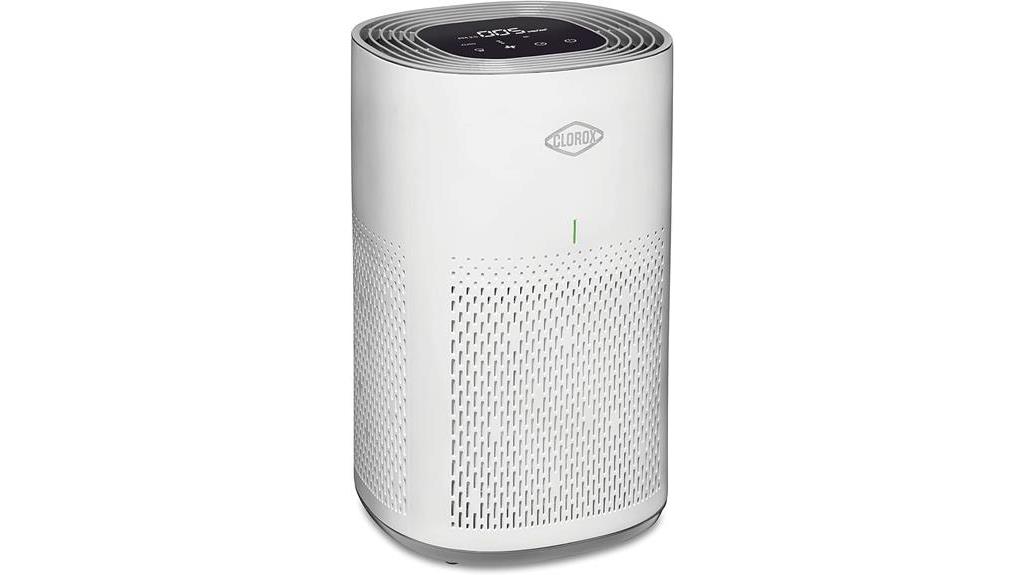
If you're looking for an air purifier that effectively tackles viruses while maintaining a quiet environment, the Clorox Air Purifier with True HEPA Filter is an excellent choice for medium-sized rooms. Designed for spaces up to 1,000 square feet, this purifier captures 99.97% of particles as small as 0.1 microns. Its 3-stage 360° filter system guarantees thorough air cleaning, addressing everything from allergens to smoke. I appreciate the real-time air quality feedback and color-coded display, making it easy to monitor my environment. Plus, it operates quietly enough for bedrooms, so I can sleep soundly. With a 4.6-star rating and effective virus removal, it's a reliable option for anyone seeking cleaner air.
Best For: Those seeking an efficient air purifier to improve indoor air quality in medium-sized rooms while effectively removing allergens and viruses.
Pros:
- True HEPA filter captures 99.97% of particles, ensuring clean air.
- Real-time air quality feedback with a color-coded display for easy monitoring.
- Quiet operation makes it suitable for use in bedrooms without disturbing sleep.
Cons:
- Requires filter replacements every 6-12 months, which can add to maintenance costs.
- Limited coverage area for larger spaces, as it is optimized for rooms up to 1,000 sq. ft.
- Button control may lack advanced features found in some smart air purifiers.
BLUEAIR Air Purifier for Bedroom (Blue Pure 511)
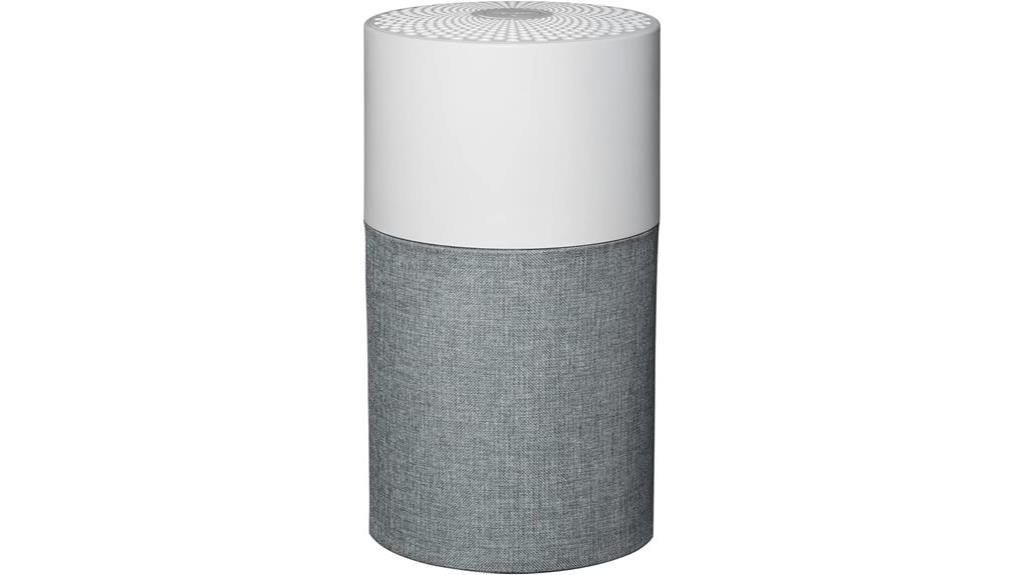
The Blueair Blue Pure 511 Air Purifier is an excellent choice for anyone seeking a compact solution to enhance bedroom air quality. With its ability to clean spaces up to 432 sq ft in just 30 minutes, it fits perfectly in my bedroom. I love its stylish design, which blends seamlessly with my decor. Plus, it operates quietly, with noise levels as low as 24 dB—ideal for a good night's sleep. The HEPASilent technology efficiently captures 99.97% of airborne particles, including viruses and allergens. Maintenance is easy too; I can wash the pre-filter and easily replace the main filter when needed. Overall, it's a reliable option for ensuring my air stays fresh and clean.
Best For: Individuals seeking a compact and efficient air purifier for improving bedroom air quality while minimizing noise disruption.
Pros:
- Energy-efficient design, using less energy than a 40-watt LED light bulb.
- HEPASilent technology effectively captures 99.97% of airborne particles, ensuring cleaner air.
- Stylish and compact design that seamlessly fits into home decor.
Cons:
- Some users find the button controls less intuitive for adjusting settings.
- Reports of difficulty in navigating the auto mode and AQI sensor features.
- Potential concerns about filter replacement frequency and availability.
BLUEAIR Air Purifiers for Small Rooms (Blue Pure 411i Max)
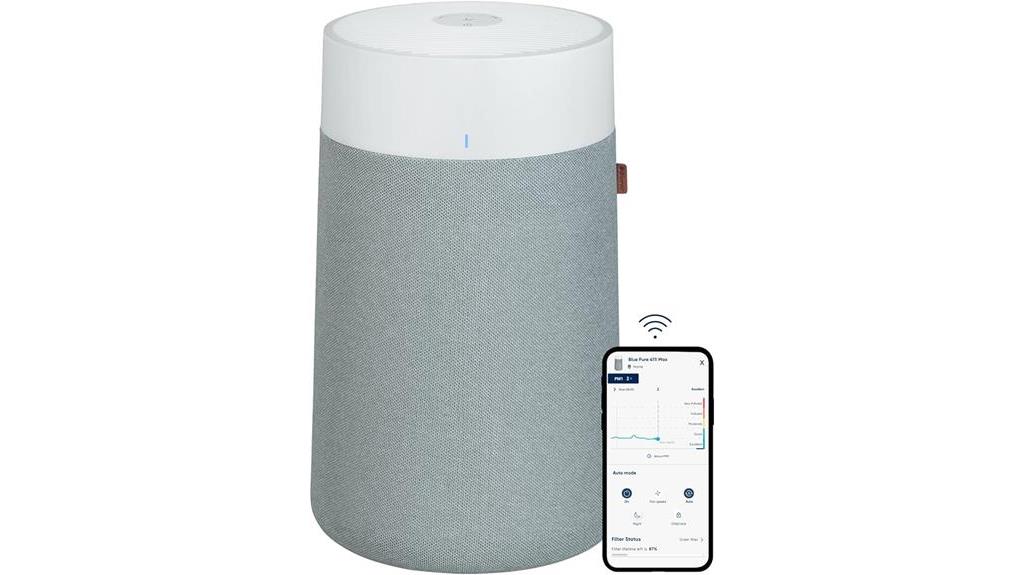
For anyone living in a small space, the BLUEAIR Blue Pure 411i Max is an ideal choice to combat airborne viruses effectively. It cleans areas up to 1,052 sqft in just one hour, making it perfect for apartments or small homes. Thanks to its HEPASilent technology, it operates quietly, with noise levels ranging from 18 to 46dB, which I find perfect for bedrooms. The dual filtration system captures 99.97% of airborne particles, including viruses, while a carbon filter tackles unwanted odors. I really appreciate the smart features, like app scheduling and air quality monitoring, which make it easy to use. Overall, its performance justifies the investment, especially for those prioritizing clean air in compact living spaces.
Best For: Individuals living in small spaces who prioritize effective air purification and quiet operation.
Pros:
- Quiet operation with noise levels as low as 18dB, making it suitable for bedrooms and nurseries.
- Effective dual filtration system that removes 99.97% of airborne particles, including viruses and allergens.
- Smart features like app scheduling and air quality monitoring enhance user convenience and control.
Cons:
- Higher price point compared to some alternative air purifiers on the market.
- Limited coverage area may not be suitable for larger living spaces without multiple units.
- Replacement filters may be costly over time, depending on usage.
Clorox Air Purifier with True HEPA Filter for Small Rooms
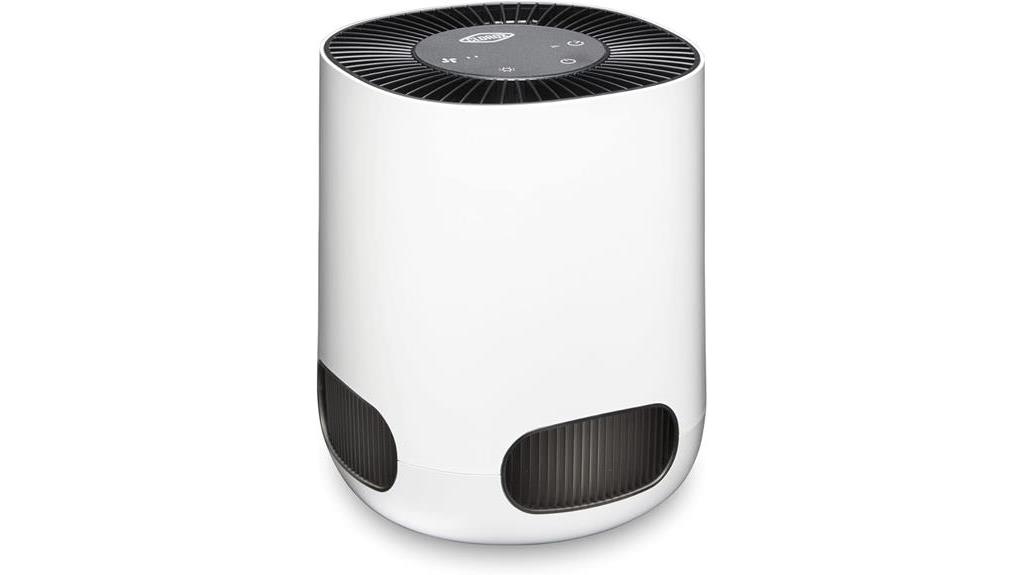
Designed specifically for small spaces, the Clorox Air Purifier with True HEPA Filter is perfect for anyone looking to enhance their indoor air quality in rooms up to 200 square feet. I love how its 2-stage 360° filtration system captures 99.97% of particles as small as 0.1 microns, making it ideal for offices, bedrooms, and nurseries. It cleans the air up to five times per hour in smaller areas, ensuring a fresh environment. The customizable settings, including three fan speeds and an optional timer, make it convenient for any schedule. Plus, its whisper-quiet operation is a game-changer for nighttime use. Just remember to replace the filter every 6-12 months for peak performance!
Best For: Individuals seeking to improve air quality in small rooms such as offices, bedrooms, and nurseries.
Pros:
- True HEPA filtration captures 99.97% of particles as small as 0.1 microns, effectively reducing allergens.
- Customizable settings with three fan speeds and a timer provide flexibility for different needs and schedules.
- Whisper-quiet operation makes it suitable for nighttime use without disturbing sleep.
Cons:
- Filter replacement is required every 6-12 months, which may incur additional costs.
- Some users report dryness in the air, suggesting the need for a humidifier alongside the purifier.
- Limited coverage for larger rooms, as it is designed specifically for spaces up to 200 sq ft.
LEVOIT Air Purifier for Home (Core300-P)
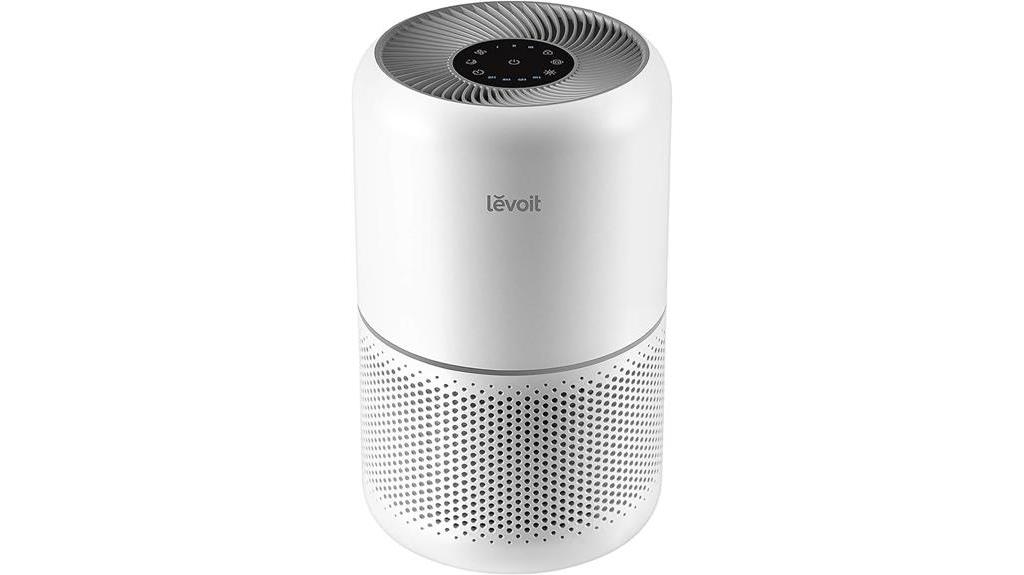
If you're looking for an air purifier that effectively tackles allergens and improves indoor air quality, the LEVOIT Core 300-P might be your best bet for 2024. With its compact size of 8.7 x 8.7 x 14.2 inches and a weight of just 7.48 lbs, it fits seamlessly into any room. The powerful 45W motor boasts a CADR of 141 CFM, covering up to 1,095 square feet, purifying the air once every hour. Its HEPA-grade filter captures 99.97% of particles, including pollen and dust. I love the quiet operation, especially with Sleep Mode reducing noise to just 24dB. Plus, the night mode and easy touch controls make it user-friendly, ensuring I breathe cleaner air without disturbance.
Best For: Individuals seeking an effective air purifier to reduce allergens and improve indoor air quality in medium to large spaces.
Pros:
- Quiet operation with a Sleep Mode that minimizes noise to just 24dB, ideal for nighttime use.
- Compact design allows for discreet placement in various home settings without compromising aesthetics.
- High CADR of 141 CFM effectively purifies air in spaces up to 1,095 square feet once every hour.
Cons:
- Requires filter replacement every 6 months, which can add to ongoing maintenance costs.
- Limited to the effectiveness of specific filter types; users may need to purchase additional filters for different air quality issues.
- Some users may find the timer and touch controls less intuitive compared to traditional knobs or switches.
Factors to Consider When Choosing Air Purifiers for Viruses
When choosing an air purifier for viruses, you'll want to contemplate several key factors. Filtration efficiency ratings, room size coverage, and noise levels can greatly impact your experience. Additionally, think about maintenance requirements and whether you prefer smart features for added convenience.
Filtration Efficiency Ratings
Choosing the right air purifier for viruses hinges on understanding filtration efficiency ratings. When evaluating air purifiers, look for models equipped with True HEPA filters. These filters capture 99.97% of particles as small as 0.1 microns, making them highly effective against viruses and airborne pathogens.
Additionally, consider the MERV (Minimum Efficiency Reporting Value) rating of the filter. A MERV rating of 13 or higher is recommended for ideal virus filtration. Higher ratings indicate a filter's ability to trap smaller particles, enhancing your purifier's effectiveness.
Another crucial factor is the Clean Air Delivery Rate (CADR), which measures the volume of filtered air an air purifier delivers. Higher CADR values signify better performance in removing pollutants like smoke, dust, and pollen, ensuring cleaner air in your space.
If you're concerned about noise, look for purifiers that utilize HEPASilent technology. This combines mechanical and electrostatic filtration, achieving at least 99.97% efficiency while operating quietly. Finally, don't forget that regular maintenance, including timely filter replacement, is essential for maintaining ideal filtration efficiency to effectively reduce viral particles in your air.
Room Size Coverage
Room size coverage is fundamental in selecting an air purifier for effectively combating viruses. When choosing a purifier, consider the maximum coverage area it can handle, which typically ranges from 200 sq ft to over 1,000 sq ft. It's important to match the purifier's capacity to the size of your room for ideal performance.
Look for models that can clean the air multiple times per hour in your designated space. For instance, if you have a 225 sq ft room, a purifier that can refresh the air five times an hour will guarantee a steady turnover of clean air, which is critical for virus removal.
Additionally, check the Clean Air Delivery Rate (CADR). A higher CADR rating means the purifier can remove specific particles, including viruses, more efficiently, especially in larger spaces. Also, make sure the filtration system can capture particles as small as 0.1 microns, as this is essential for filtering out viruses and bacteria effectively.
Noise Levels
Noise levels play an essential role in your decision-making process for selecting an air purifier to combat viruses effectively. When you're considering an air purifier, you'll notice that noise levels can vary considerably. Some models operate as quietly as 18 dB on low settings, making them perfect for bedrooms and nurseries. Many air purifiers also feature a sleep mode that reduces noise to around 24 dB, ensuring minimal disruption during nighttime use.
However, if you opt for higher settings, you might encounter noise levels around 49 dB, which can be noticeable in quiet environments. This is especially important if you or anyone in your home is sensitive to sound. On average, compact air purifiers range from 55 dB to 60 dB, comparable to a soft conversation or background noise.
Choosing an air purifier with a low noise output is vital for maintaining a peaceful home environment. You want to effectively reduce airborne viruses and other pollutants without adding unwanted noise to your living space. Consider your needs and preferences to find the right balance between effective air purification and a quiet atmosphere.
Maintenance Requirements
When evaluating air purifiers for viruses, maintenance requirements are a key factor that can considerably impact their effectiveness. Regular maintenance typically involves replacing filters every 6-12 months. This guarantees peak performance in capturing viruses and other airborne particles. Some models come with washable pre-filters, allowing you to clean them regularly, which enhances efficiency and prolongs the life of the primary filters, reducing how often you need to replace them.
It's essential to monitor filter conditions and air quality indicators. Many air purifiers provide real-time feedback on performance and filter lifespan, making it easier for you to know when maintenance is needed. Proper cleaning and upkeep can prevent dust and allergens from accumulating, which could hinder the air purifier's ability to fight off viruses.
Lastly, always use genuine replacement filters recommended by the manufacturer. Third-party filters might not deliver the same level of filtration efficiency, potentially putting your health at risk. By staying on top of maintenance, you guarantee your air purifier operates at its best, keeping your environment safe and clean.
Smart Features
Smart features in air purifiers can greatly enhance your experience in managing indoor air quality, especially when it comes to combating viruses. With app scheduling, you can set your purifier to run at specific times, guaranteeing that your space is clean when you need it most. Air quality monitoring gives you real-time updates on your environment, so you'll always know what's in the air you breathe.
Many advanced models include automatic modes that adjust fan speed based on air quality readings, optimizing performance without any manual effort on your part. Additionally, color-coded air quality indicators provide immediate visual feedback, helping you quickly assess when adjustments are necessary.
If you're into smart home technology, look for air purifiers with voice control compatibility. This allows for hands-free operation with your favorite devices, making it even easier to manage your air quality. Some purifiers even come with geofencing capabilities, activating or deactivating based on your proximity, which adds another layer of convenience and efficiency. These smart features not only enhance usability but also guarantee your home remains a safe haven against airborne viruses.
Energy Consumption
How much energy an air purifier consumes can greatly impact your overall electricity costs, especially when you're using it to combat viruses. Most air purifiers operate between 40 to 120 watts, which can add up on your electricity bill. If you're looking for savings, consider Energy Star certified models. These are designed to use less energy, often consuming less power than a standard light bulb.
On average, running an air purifier continuously for 24 hours can cost you between $3 to $30 per month, depending on the unit's wattage and your local electricity rates. Be mindful of the fan speed settings; higher speeds use more power, while lower speeds are more energy-efficient for continuous operation.
Additionally, regular maintenance plays an important role in energy consumption. Timely filter replacements will keep your air purifier running efficiently, as clogged filters make the unit work harder, increasing energy use. By considering these factors, you can choose an air purifier that not only keeps your air clean but also helps you manage your energy costs effectively.
Design and Aesthetics
Choosing the right air purifier goes beyond just its filtration capabilities; the design and aesthetics play an essential role in how well it fits into your living space. When selecting an air purifier, consider compact models that seamlessly integrate into various home decor styles and small spaces. A visually appealing design, such as modern finishes or customizable pre-filters, not only enhances your room's aesthetics but also guarantees you won't mind having it on display.
Look for intuitive controls and displays, as these features make operation easy without detracting from your room's overall look. Additionally, the size and shape of the purifier can impact noise levels and airflow efficiency. Some models are engineered to operate quietly, allowing them to blend in with your furniture while still functioning effectively.
Ultimately, choosing an air purifier with a design you love can encourage consistent use. You're more likely to keep it visible, which means it'll be working hard to keep your air clean and safe. So, pick a model that complements your style while providing the essential benefits you need for a healthier home.
Replacement Filter Availability
Maintaining ideal air quality relies heavily on the availability of replacement filters for your air purifier. Regular maintenance is essential for guaranteeing your device performs at its best and effectively captures airborne viruses and particulates. When choosing an air purifier, consider how often you'll need to replace the filters, typically every 6 to 12 months. This timeline can vary based on your usage and local air quality conditions.
It's wise to purchase genuine replacement filters recommended by the manufacturer. These filters are designed specifically for your model, assuring compatibility and maximum efficiency. Some purifiers also offer multiple filter options that target specific contaminants, like VOCs or pet dander, so think about your particular needs when making your choice.
Additionally, look for models equipped with filter life indicators or monitoring systems. These features help you track when it's time to change the filters, enhancing convenience and maintaining performance. By considering replacement filter availability, you can guarantee your air purifier continues to provide clean, safe air for you and your family.
Frequently Asked Questions
How Often Should I Replace the Filters in My Air Purifier?
You should replace the filters in your air purifier every 6 to 12 months, depending on usage and the type of filter. If you run it continuously or have pets and allergies, consider changing them more frequently, like every 3 to 6 months. Regular filter replacements guarantee your purifier works efficiently, capturing allergens and pollutants effectively. Always check the manufacturer's guidelines for specific recommendations tailored to your model. Keep your air fresh and clean!
Do Air Purifiers Eliminate Odors as Well as Viruses?
Yes, air purifiers can eliminate odors as well as viruses. When you choose a model with a HEPA filter and activated carbon, it helps trap airborne particles, including odors from smoke, pets, or cooking. You'll notice fresher air in your space. However, keep in mind that while they reduce odors, they won't remove them entirely if the source isn't addressed. Regular maintenance and filter changes will also enhance their effectiveness in both areas.
Can I Use an Air Purifier in a Bathroom?
Yes, you can use an air purifier in a bathroom! In fact, it can help reduce humidity, eliminate odors, and improve air quality. Just make sure to choose a model that's compact and designed for smaller spaces. Keep in mind that some purifiers may struggle with moisture, so look for one with a HEPA filter and a good moisture resistance rating. This way, you'll breathe easier and enjoy a fresher bathroom environment!
How Noisy Are These Air Purifiers During Operation?
You'd think air purifiers would sound like a jet engine, right? Surprisingly, most modern models operate quietly, allowing you to enjoy peace while they do their job. Many are designed with noise levels comparable to a whisper, so you won't even notice they're working. Of course, some might have a slight hum on higher settings, but it's usually bearable. Overall, you can breathe easy without the distraction of loud machinery.
Are Air Purifiers Safe for Pets and Children?
Air purifiers can be safe for pets and children, but it's essential to choose the right one. Look for models that don't emit ozone or harmful chemicals, as these can be irritating. HEPA filters are generally pet-friendly, trapping allergens without posing risks. Always place the purifier out of reach of curious little hands or paws. Regular maintenance and filter changes will guarantee it operates safely, keeping the air clean for your loved ones.
Wrapping Up
So, if you want to breathe easy and keep those pesky viruses at bay, grab one of these exceptional air purifiers. Just imagine your room transforming into a sterile bubble of freshness, where viruses fear to tread—like a VIP lounge for clean air! With these machines humming away, you can finally relax, knowing your home is a fortress against airborne invaders. It's like having a tiny, invisible army protecting your lungs. Stay safe, breathe easy, and let the purifiers do their thing!

Hi, I’m Charlie, and I cover all things laundry here at Appliance Mastery.
I’ve spent over eight years working on washing machines, dryers, and dishwashers. I also have a degree in mechanical engineering, which helps me understand how these appliances really work.
I try to make every guide clear and practical. If you’re stuck with a noisy dryer or a leaking washer, I’ll help you figure out what’s wrong and how to fix it.
